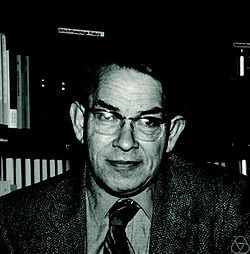Walter Hayman facts for kids
Quick facts for kids
Walter Hayman
|
|
|---|---|
 |
|
| Born |
Walter Kurt Hayman
6 January 1926 Cologne, Germany
|
| Died | 1 January 2020 (aged 93) |
| Nationality | British |
| Education | University of Cambridge |
| Known for | Theory of subharmonic functions Univalent function theory |
| Spouse(s) | Margaret Hayman (née Crann) |
| Awards | Berwick Prize (1955) Senior Berwick Prize (1964) De Morgan Medal (1995) |
| Scientific career | |
| Fields | Complex analysis |
| Institutions | King's College, Newcastle University of Exeter Imperial College |
Walter Kurt Hayman FRS (6 January 1926 – 1 January 2020) was a British mathematician known for contributions to complex analysis. He was a professor at Imperial College London.
Life and work
Hayman was born in Cologne, Germany, the son of Roman law professor Franz Haymann (1874-1947) and Ruth Therese Hensel, daughter of mathematician Kurt Hensel. He was a great-grandson of acclaimed composer Fanny Mendelssohn. Because of his Jewish heritage, he left Germany, then under Nazi rule, alone by train in 1938. He continued his schooling at Gordonstoun School, and later at St John's College, Cambridge under John Edensor Littlewood and his doctoral advisor Mary Cartwright. He taught at King's College, Newcastle, and the University of Exeter.
In 1947, he married Margaret Riley Crann: together, they founded the British Mathematical Olympiad.
He is known for his asymptotic results in Bieberbach conjecture in 1955, and for Hayman's alternatives in Nevanlinna Theory. His work with Wolfgang Fuchs gave a solution to an inverse problem of the Nevanlinna theory for entire functions, predating David Drasin's 1976 work.
Honours and awards
Hayman was elected to the Royal Society in 1956 and of the Finnish Academy of Science and Letters in 1978: he was elected "Foreign member" of the Accademia dei Lincei on 16 December 1985. In 1992 he received an honorary doctorate from the Faculty of Mathematics and Science at Uppsala University, Sweden In 1995 he was awarded the De Morgan Medal by the London Mathematical Society. In 2008, an issue of the Journal Computational Methods and Function Theory was dedicated to him on the occasion of his 80th birthday.
Selected publications
Papers
- .
- .
- .
- .
- .
Books
- .
- .
- .
- .
- .


